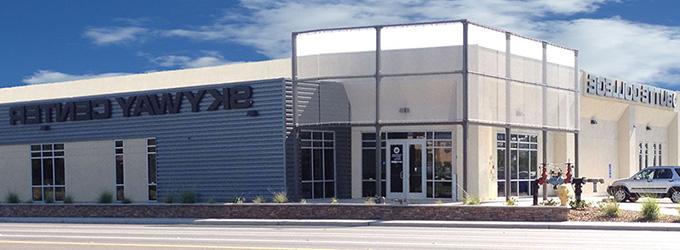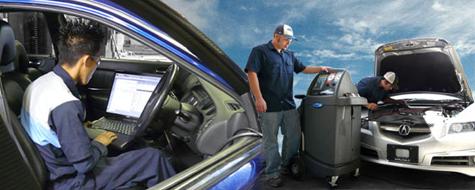SubMenu

General Automotive Program
The Butte College General Automotive Program is the foundation, the core of what we do here. It consists of a group of accredited (ASE) classes that prepares our students for a career in general automotive repair. This program takes four semesters to complete, and can be combined with G.E. (General Education) classes for a A.S. degree in Automotive Technology. Below you will find the class names and descriptions that you would take in this program. For more information, sign up for our Program Tour.
AUT-101 Automotive Shop Fundamentals (3 units)
Fundamental introduction to the major systems of the automobile including safety and
preventative maintenance services. This course will focus on Auto Shop Fundamentals
and repair for individuals with little to no automotive repair or auto shop experience.
Topics will include: Automotive industry tools and usage, Automobile systems theory
and repair, vehicle maintenance, emergency roadside repair, buying a used vehicle,
safety inspection, and automotive industry career opportunities.
(Class Meets two days a week)
Auto 3 - Specialized Automotive Electronics (6 units)
This class is a prerequisite to all of the remaining core courses in our program.
The automotive industry relies heavily on electronics so students must take this course
first in their training. Also in terms of safety, new Hybrid vehicles have been involved
in the death and injury of several technicians. This class is a must for technician
safety and understanding of complex electrical subsystems.
Auto 6 & 7 - Chassis Electrical (4 units)
This class covers chassis electrical systems including batteries, starters, alternators,
electrical accessories and body controlled multiplexing systems. This class places
a heavy emphasis on the diagnostic service procedures of these systems.
(Class meets daily)
Auto 20 & 21 - Brakes and Suspension (6 units)
This class covers brakes, suspension and steering including anti-lock brakes and electronic
stability control. Design features, principles and service procedures are covered.
(Class meets daily)
Auto 8 & 9 - Engines (5 units)
This class covers engine design, construction, diagnostic procedures and service procedures.
I
(Class meets daily)
Auto 22 & 23 - HVAC (4 units)
This class covers air conditioning and heating system principles, designs, servicing,
diagnostic procedures and safety. This class places a heavy emphasis on personnel
safety and environmental safety while working with heating and air conditioning servicing
equipment.
(Class meets daily)
Auto 52 & 53 - Automatic Transmissions (6 units)
Automatic transmissions and transaxles are studied. Design, theory, construction,
servicing and diagnostic procedures are explored. This course places an emphasis on
electronically controlled transmissions. Manual drive trains are looked at including
transmissions, rear differentials, clutches, transfer cases, drive shafts and CV halfshafts.
Design, theory, construction, servicing and diagnostic procedures are studied.
(Class meets daily)
Auto 56 & 57 - Manual Drive Trains (4 units)
Manual drive trains are looked at including transmissions, rear differentials, clutches,
transfer cases, drive shafts and CV halfshafts. Design, theory, construction, servicing
and diagnostic procedures are studied.
(Class meets daily)
Auto 30 & 31 - Gas/Diesel Engine Performance and Emissions (10 units)
This class focuses the entire semester on ignition, fuel, emissions and diagnostic
test procedures for today's modern computer controlled vehicles. A major portion of
this class focuses on the diagnostic procedures of these systems. Service procedures,
theory, safety and design are also studied.
(Class meets daily)
Auto 60 - Hybrid and Alternative Fuel Technologies (2.00 units)
This course covers the theory of operation and service of alternative fuel and hybrid
powered cars and light trucks. Topics include fuel tank and battery inspection service,
regenerative braking systems, motor/generator and transmission, and fuel cell technologies.
Emphasis is placed on safety precautions necessary when servicing hybrid and alternative
fueled vehicles. Students will be working on and around the high voltage electrical
system on hybrid vehicles. Due to the potential for electrical shock, students must
demonstrate an understanding of electrical theory and safety by successfully passing
the AUT 60 entrance exam with a score of 70% or more on the first day of class.
Responsibility:
- Candidates will have to wear Butte College Automotive uniforms (including shirts, pants and safety glasses) or a dealership provided work uniform during school.
- Candidates are responsible for all program costs, including tuition, fees, books and tools.




